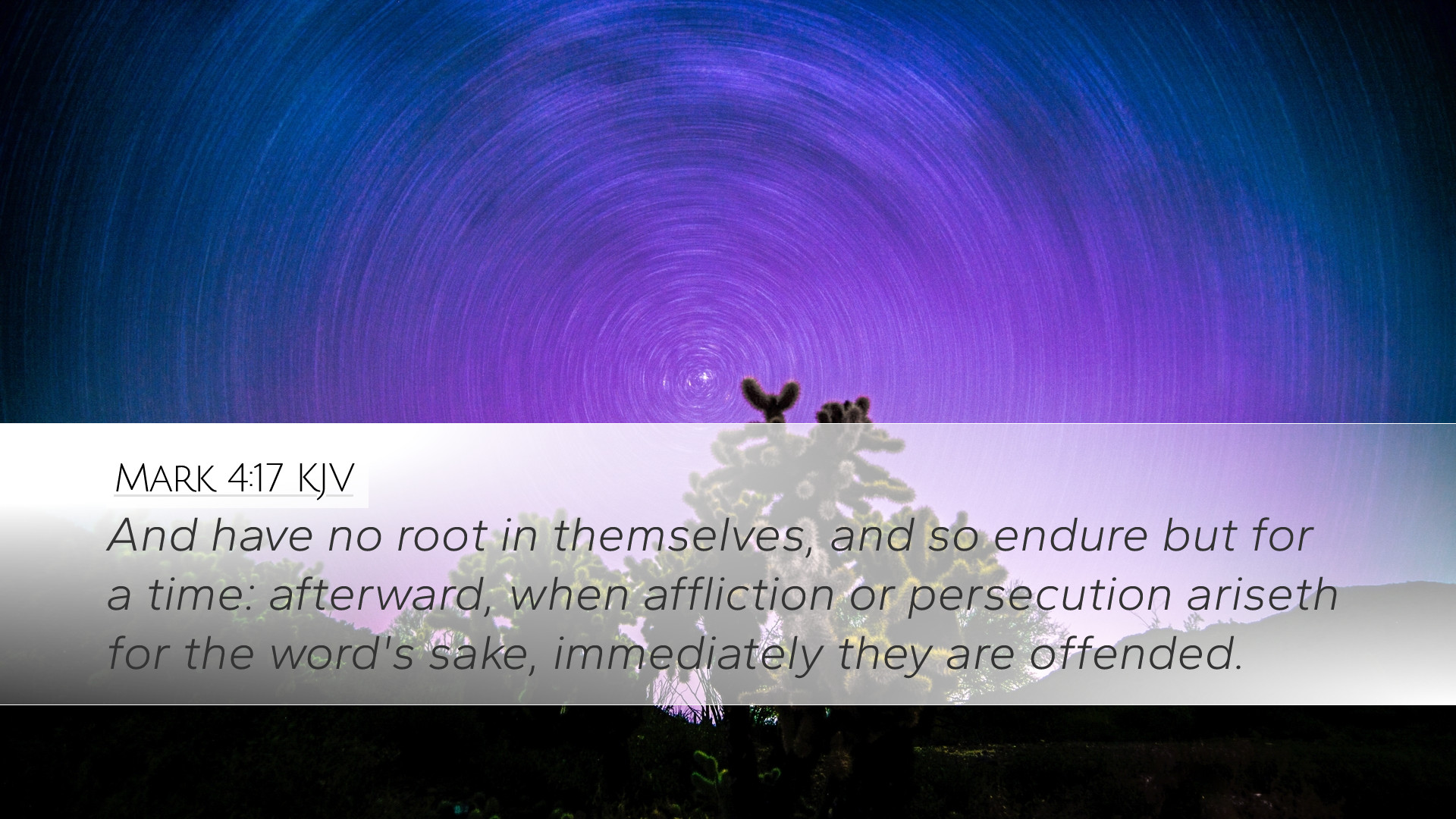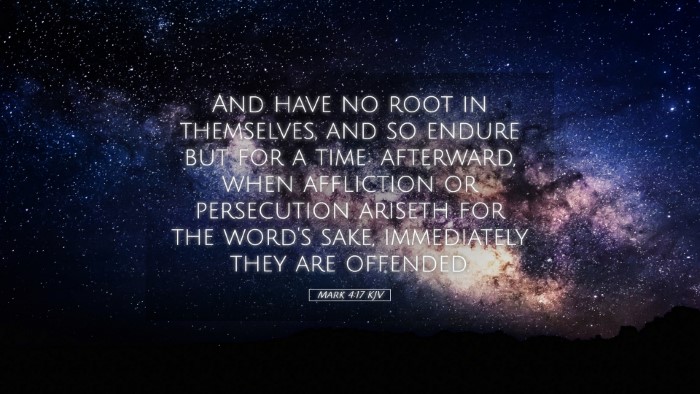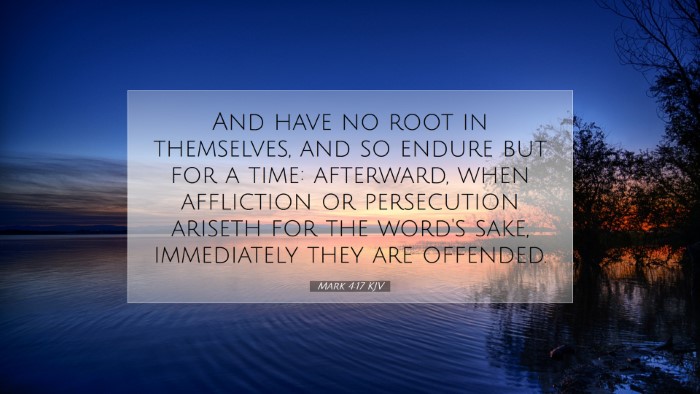Commentary on Mark 4:17
Mark 4:17 states, "And have no root in themselves, and so endure but for a time: afterward, when affliction or persecution ariseth for the word's sake, immediately they are offended." This verse comes within the context of the Parable of the Sower, which illustrates the varied reactions of people to the Gospel based on the condition of their hearts.
Contextual Overview
This parable is critical in understanding how the message of Christ is received, emphasizing that the seed, which represents the Word of God, meets different responses depending on the soil, symbolic of the heart's condition. Each type of soil signifies a particular heart attitude towards God's Word.
Analysis of Mark 4:17
1. Lack of Root
Public Domain Commentary Insights:
- Matthew Henry: He notes that the plants sprang up quickly but lacked depth, illustrating a superficial reception of the Gospel. These individuals may exhibit initial enthusiasm but do not possess a genuine, deep-rooted faith.
- Albert Barnes: Barnes elaborates on the absence of spiritual roots, emphasizing that a true understanding of God's Word requires deep engagement and commitment. He warns that those without roots are vulnerable to trials and tribulations.
- Adam Clarke: Clarke points out that a lack of depth leads to spiritual fragility. When difficulties arise, those who have no rooted faith are easily shaken and turn away from their initial acceptance of the Gospel.
2. Enduring Only for a Time
The phrase, "endure but for a time," underscores the fleeting nature of their faith. They embrace the Word joyfully as long as circumstances are favorable.
- Matthew Henry: He describes these individuals as "temporary believers." Their faith, while genuine in the moment, does not withstand adversity.
- Albert Barnes: Barnes states that trials serve as a true test of faith, revealing whether it is genuine or merely an emotional response.
- Adam Clarke: Clarke emphasizes that the energy of their initial reception cannot last without the nurturing that comes from a deep-rooted faith. Challenges are inevitable, and without spiritual resilience, their faith collapses.
3. Affliction and Persecution
The latter part of the verse introduces the reality that afflictions and persecutions are to be expected. The phrase "for the word's sake" indicates that these challenges arise specifically due to commitment to the Gospel.
- Matthew Henry: He emphasizes that trials are permitted by God, serving to test the believer's faith. Genuine believers will endure through such trials.
- Albert Barnes: Barnes argues that the persecutions faced by believers are often a result of their commitment to God's Word. Such hardships reveal the true nature of their faith.
- Adam Clarke: Clarke identifies this as a call to spiritual maturity, suggesting that facing adversity ultimately strengthens one’s faith. He advises that true followers must be prepared to confront challenges without faltering.
4. Offense Taken
The conclusion of the verse, "immediately they are offended," suggests a reaction of disillusionment when faced with challenges.
- Matthew Henry: He notes that the sudden offense taken indicates a lack of understanding and commitment, reflecting poorly on the initial response to the Gospel's message.
- Albert Barnes: Barnes expresses that the offense arises from a misunderstanding of the nature of discipleship. When following Christ becomes difficult, these individuals turn away rather than persevere.
- Adam Clarke: Clarke poignantly remarks that those who stumble "immediately" signify those who lack patience and endurance. Their quick retreat speaks to a superficial engagement with the faith.
Theological Implications
This verse provides profound insights into the challenges associated with the Christian faith. It warns of the implications of shallow belief and the necessity of deep-rooted faith that can withstand trials.
- Spiritual Depth: It underscores the need for believers to cultivate a faith that is not only enthusiastic but is also enriched by understanding, prayer, and community.
- Resilience in Faith: Highlighting the importance of resilience, the verse elucidates that hardships are part of the Christian journey and ought to be met with courage and steadfastness.
- Discipleship Commitment: The concept of discipleship is multidimensional and requires more than an emotional response; a lifelong commitment characterized by deepening faith amidst challenges is vital for true discipleship.
Conclusion
Mark 4:17 serves as a sobering reminder of the varied responses to the Gospel. It highlights the necessity for deep, grounded faith capable of enduring through trials and tribulations. For pastors, students, theologians, and Bible scholars, this commentary encourages an in-depth exploration of personal faith and the importance of developing a profound relationship with God through His Word. Only those who cultivate such a faith will be equipped to face the inevitable trials that come with following Christ.


